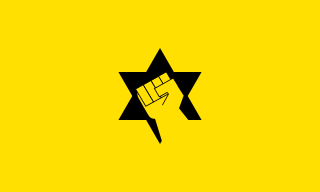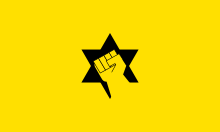
Likud, officially known as Likud – National Liberal Movement, is a major right-wing political party in Israel. It was founded in 1973 by Menachem Begin and Ariel Sharon in an alliance with several right-wing parties. Likud's landslide victory in the 1977 elections was a major turning point in the country's political history, marking the first time the left had lost power. In addition, it was the first time in Israel that a right-wing party won the plurality of the votes. After ruling the country for most of the 1980s, the party lost the Knesset election in 1992. Likud's candidate Benjamin Netanyahu won the vote for Prime Minister in 1996 and was given the task of forming a government after the 1996 elections. Netanyahu's government fell apart after a vote of no confidence, which led to elections being called in 1999 and Likud losing power to the One Israel coalition led by Ehud Barak.

Revisionist Zionism is a form of Zionism characterized by territorial maximalism. Revisionist Zionism promoted expansionism and the establishment of a Jewish majority on both sides of the Jordan River.

The Religious Zionist Party, known as Tkuma until 2021 and officially known as National Union–Tkuma, was a far-right, ultra-nationalist, Jewish supremacist, and religious Zionist political party in Israel. In all the elections since its founding in 1998, the party had joined other factions and competed as part of a united list. In 2023, the Religious Zionist Party and The Jewish Home agreed to merge to become National Religious Party–Religious Zionism.

Abba Ahimeir was a Russian-born Jewish journalist, historian, and political activist. One of the ideologues of Revisionist Zionism, he was the founder of the Revisionist Maximalist faction of the Zionist Revisionist Movement (ZRM) and of the clandestine Brit HaBirionim. While often marginalised in the past, Ahimeir’s historical importance and ideological influence are gradually being given the recognition that they deserve. Colin Shindler contends that the title of 'Father of the Revolt' should be shared equally between Ze'ev Jabotinsky and Ahimeir.

Brit HaBirionim was a self-declared faction of the Revisionist Zionist Movement (ZRM) in Mandatory Palestine, active between 1930 and 1933. It was founded by Abba Ahimeir, Uri Zvi Greenberg and Yehoshua Yeivin.
As an organized nationalist movement, Zionism is generally considered to have been founded by Theodor Herzl in 1897. However, the history of Zionism began earlier and is intertwined with Jewish history and Judaism. The organizations of Hovevei Zion, held as the forerunners of modern Zionist ideals, were responsible for the creation of 20 Jewish towns in Palestine between 1870 and 1897.
Revisionist Maximalism was a short-lived right-wing militant political ideology and Jewish militant ideology which was part of the Brit HaBirionim faction of the Zionist Revisionist Movement (ZRM) created by Abba Ahimeir.

The common definition of Zionism was principally the endorsement of the Jewish people to return to their homeland, secondarily the claim that due to a lack of self-determination, this territory must be re-established as a Jewish state. Zionism was produced by various philosophers representing different approaches concerning the objective and path that Zionism should follow.

Otzma Yehudit or Jewish Power is a far-right, ultra-nationalist, Kahanist and anti-Arab political party in Israel. It is the ideological descendant of the anti-Arab, and outlawed, Kach party.

Kahanism is a religious Zionist ideology based on the views of Rabbi Meir Kahane, founder of the Jewish Defense League and the Kach party in Israel.
Politics in Israel are dominated by Zionist parties. They traditionally fall into three camps, the first two being the largest: Labor Zionism, revisionist Zionism, and religious Zionism. There are also several non-Zionist Orthodox religious parties and non-Zionist secular left-wing groups, as well as non-Zionist and anti-Zionist Israeli Arab parties.

Bezalel Yoel Smotrich is an Israeli far-right politician and lawyer who has served as the Minister of Finance since 2022. The leader of the National Religious Party–Religious Zionism, he previously served as a Knesset member for Yamina.

Itamar Ben-Gvir is an Israeli far-right politician and lawyer who has served as the Minister of National Security since 2022. He is the leader of Otzma Yehudit, a Kahanist and anti-Arab party that won six seats in the 2022 Israeli legislative election, and is part of what has been called the most right-wing government in Israel's history.

Comparisons between Israel and Nazi Germany occur frequently in some veins of anti-Zionism in relation to the Israeli–Palestinian conflict. The legitimacy of these comparisons and their potential antisemitic nature is a matter of debate. Historically, figures like historian Arnold J. Toynbee have drawn parallels between Zionism and Nazism, a stance he maintained despite criticism. Scholar David Feldman suggests these comparisons are often rhetorical tools without specific antisemitic intent. The Anti-Defamation League (ADL) sees them as diminishing the Holocaust's significance.

Ofer Cassif is a far-left Israeli politician who has represented Hadash in the Knesset since April 2019.
Yamina or Yemina was an Israeli political alliance of right-wing parties that originally included the New Right and the Union of Right-Wing Parties. The current incarnation of the alliance includes only the New Right, as The Jewish Home left the alliance on 14 July 2020, and the Religious Zionist Party left on 20 January 2021.
Legislative elections were held in Israel on 1 November 2022 to elect the 120 members of the 25th Knesset. The results saw the right-wing national camp of former prime minister Benjamin Netanyahu win a parliamentary majority, amid losses for left-wing and Arab parties, as well as gains by the far-right.
Zionist antisemitism or antisemitic Zionism refers to a phenomenon in which antisemites express support for Zionism and the State of Israel. In some cases, this support may be promoted for explicitly antisemitic reasons. Historically, this type of antisemitism has been most notable among Christian Zionists, who may perpetrate religious antisemitism while being outspoken in their support for Jewish sovereignty in Israel due to their interpretation of Christian eschatology. Similarly, people who identify with the political far-right, particularly in Europe and the United States, may support the Zionist movement because they seek to expel Jews from their country and see Zionism as the least complicated method of achieving this goal and satisfying their racial antisemitism.

Far-right politics in Israel encompasses ideologies such as ultranationalism, Jewish supremacy, Jewish fascism, Jewish fundamentalism, Anti-Arabism, anti-Palestinianism, and ideological movements such as Kahanism
Conservatism in Israel is mostly based around upholding Jewish tradition, promotion of forms of Zionism that tend to be more irredentist in nature, promoting Israeli national security, maintaining the role of religion and the Rabbinate in the public sphere, support for the free market, and closer ties with the United States. However, a variety of ideological trends exist within Israeli conservatism, and not all hold up every single one of these ideals or points of view.





















